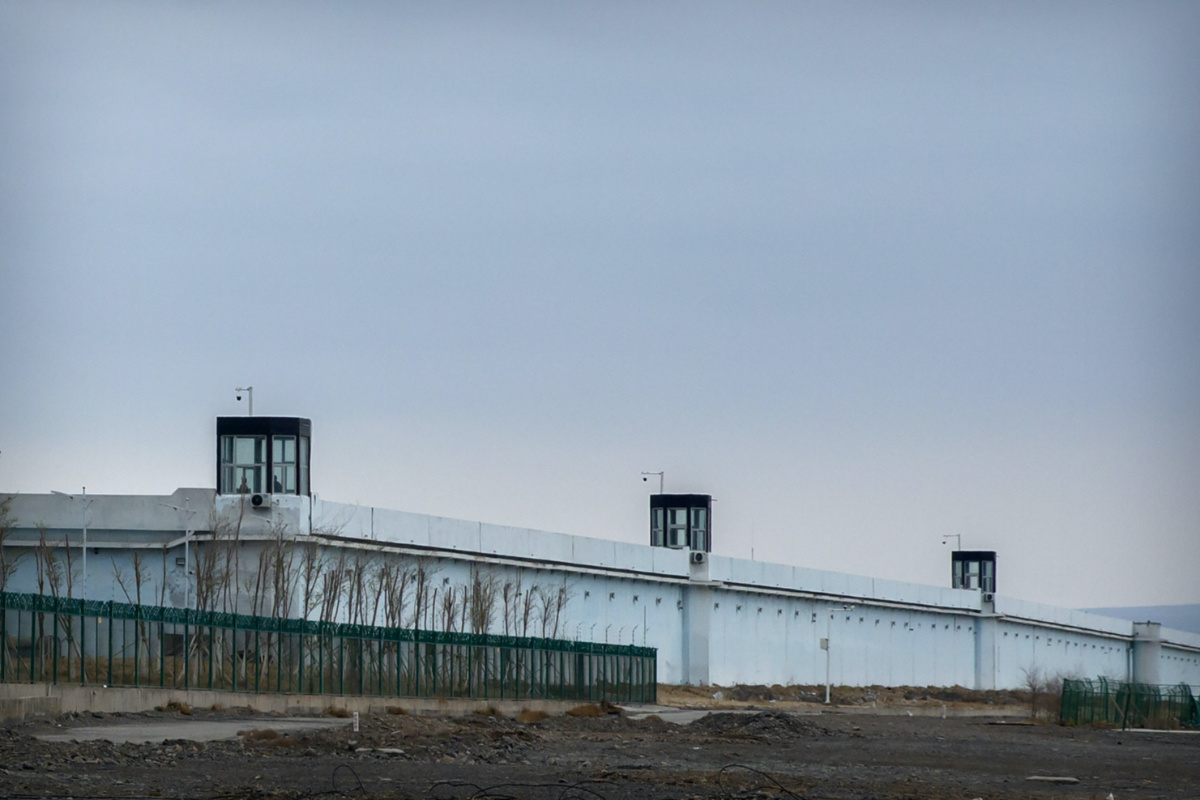
HUIZHONG WU and DAKE KANG, of Associated Press, report on what a data leak has revealed about the imprisonment of Uyghurs in China…
Beijing, China
AP
Nearly one in 25 people in a county in the Uyghur heartland of China has been sentenced to prison on terrorism-related charges, in what is the highest known imprisonment rate in the world, an Associated Press review of leaked data shows.
A list obtained and partially verified by the AP cites the names of more than 10,000 Uyghurs sent to prison in just Konasheher county alone, one of dozens in southern Xinjiang. In recent years, China has waged a brutal crackdown on the Uyghurs, a largely Muslim minority, which it has described as a war on terror.

People stand in a guard tower on the perimeter wall of the Urumqi No 3 Detention Center in Dabancheng in western China’s Xinjiang Uyghur Autonomous Region on on 23rd April, 2021. State officials took AP journalists on a tour of a “training centre” turned detention site in Dabancheng sprawling over 90 hectares and estimated to hold at least 10,000 prisoners – making it by far the largest detention centre in China and among the largest on the planet. PICTURE: AP Photo/Mark Schiefelbein/File photo.
The list is by far the biggest to emerge to date with the names of imprisoned Uyghurs, reflecting the sheer size of a Chinese government campaign by which an estimated million or more people were swept into internment camps and prisons. It also confirms what families and rights groups have said for years: China is relying on a system of long-term incarceration to keep the Uyghurs in check, wielding the law as a weapon of repression.
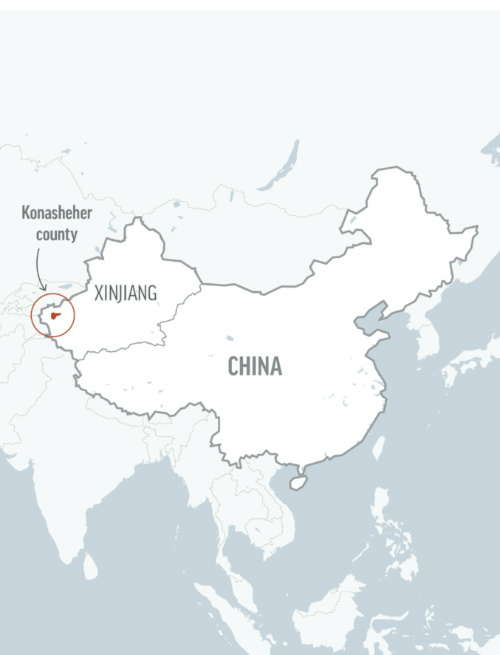
Konasheher County is a county in Kashgar Prefecture, Xinjiang Uyghur Autonomous Region, China.
The list is by far the biggest to emerge to date with the names of imprisoned Uyghurs, reflecting the sheer size of a Chinese government campaign by which an estimated million or more people were swept into internment camps and prisons. It also confirms what families and rights groups have said for years: China is relying on a system of long-term incarceration to keep the Uyghurs in check, wielding the law as a weapon of repression.
Under searing international criticism, Chinese officials announced the closure in 2019 of short-term, extrajudicial internment camps where Uyghurs were thrown in without charges. However, although attention focused on the camps, thousands of Uyghurs still languish for years or even decades in prison on what experts say are trumped-up charges of terrorism.
Uyghur farmer Rozikari Tohti was known as a soft-spoken, family-loving man with three children and not the slightest interest in religion. So his cousin, Mihrigul Musa, was shocked to discover Tohti had been thrown into prison for five years for “religious extremism”. She said she knew others more likely to be swept up in Xinjiang’s crackdown on religion, such as another cousin who prayed every week, but not Tohti.
“Never did I think he would be arrested,” said Musa, who now lives in exile in Norway. “If you saw him, you would feel the same way. He is so earnest.”
From the list, Musa found out Tohti’s younger brother Abilikim Tohti also was sentenced to seven years on charges of “gathering the public to disturb social order”. Tohti’s next-door neighbour, a farmer called Nurmemet Dawut, was sentenced to 11 years on the same charges as well as “picking quarrels and provoking trouble.”
Konasheher county is typical of rural southern Xinjiang, and more than 267,000 people live there. The prison sentences across the county were for two to 25 years, with an average of nine years, the list shows. While the people on the list were mostly arrested in 2017, according to Uyghurs in exile, their sentences are so long that the vast majority would still be in prison.
Those swept up came from all walks of life, and included men, women, young people and the elderly. They had only one thing in common: They were all Uyghurs.
Experts say it clearly shows people were targeted simply for being Uyghur – a conclusion vehemently denied by Chinese authorities. Xinjiang spokesman Elijan Anayat said sentences were carried out in accordance with the law.
“We would never specifically target specific regions, ethnic groups or religions, much less the Uyghurs,” Anayat said. “We would never wrong the good, nor release the bad.”
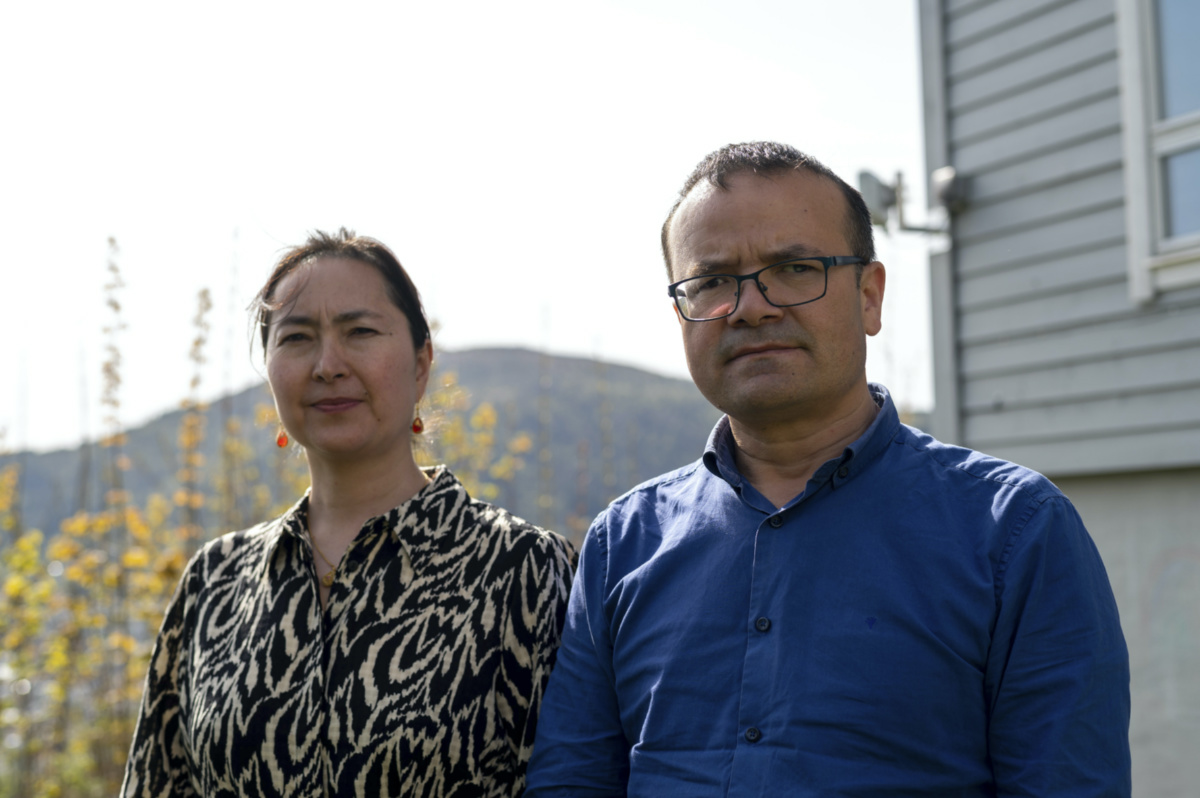
Uyghur couple Mihrigul Musa, left, and Abduweli Ayup pose for a photograph in their yard in Bergen, Norway on 8th May. Ayup and Musa knew friends and relatives sentenced to prison according to the list. PICTURE: AP Photo/Paul Johannessen.
The list offers the widest and most granular look yet at who is in prison in Xinjiang. It was obtained by Xinjiang scholar Gene Bunin from an anonymous source who described themselves as a member of China’s Han Chinese majority “opposed to the Chinese government’s policies in Xinjiang”.
The list was passed to The AP by Abduweli Ayup, an exiled Uyghur linguist in Norway. The AP authenticated it through interviews with eight Uyghurs who recognised 194 people on the list, as well as legal notices, recordings of phone calls with Chinese officials and checks of address, birthdays and identity numbers.
The list does not include people with typical criminal charges such as homicide or theft. Rather, it focuses on offences related to terrorism, religious extremism or vague charges traditionally used against political dissidents, such as “picking quarrels and provoking trouble.” This means the true number of people imprisoned is almost certainly higher.
But even at a conservative estimate, Konasheher county’s imprisonment rate is more than 10 times higher than that of the United States, one of the world’s leading jailers, according to Department of Justice statistics. It’s also more than 30 times higher than for China as a whole, according to state statistics from 2013, the last time such figures were released.
Darren Byler, an expert on Xinjiang’s mass incarceration system, said most arrests were arbitrary and outside the law, with people detained for having relatives abroad or downloading certain cell phone applications. He has documented arrest quotas for local police, in some cases resulting in the men from entire villages being rounded up and whole families uprooted from their homes.
“It is really remarkable,” Byler said. “In no other location have we seen entire populations of people be described as terrorists or seen as terrorists…The state is trying to reframe the narrative and say, you know, all of these people are actually criminals.”
China has struggled for decades to control Xinjiang, where Uyghurs have long resented Beijing’s heavy-handed rule, resulting in violent clashes with the Han-dominated government. With the 9/11 attacks in the United States, Chinese officials began using the specter of terrorism to justify tight controls.
The crackdown kicked into high gear in 2017, after a string of knifings and bombings carried out by a small handful of Uyghur militants. The Chinese Government defended the mass detentions as both lawful and necessary to combat terrorism.
In December, 2019, Xinjiang officials said that all of whom they described as “trainees” at the “centers” had “graduated”. Visits by Associated Press journalists to four former camp sites confirmed that they were shuttered or converted into other facilities.
But the prisons remain. Xinjiang went on a prison-building spree in tandem with the crackdown, and even as the camps closed, the prisons expanded. At least a few camp sites were converted into centers for incarceration, including one that was turned into a pre-trial detention center twice the size of Vatican City and estimated to have capacity for 10,000 people or more.
Satellite imagery obtained and analysed by BuzzFeed suggests that by April, 2021, the Chinese Government had enough prison space in Xinjiang to cover a third of the island of Manhattan. In the meantime, China declared success in keeping Xinjiang safe.
“In the past five years, Xinjiang has been free from violent terrorist incidents,” said China’s Foreign Minister Wang Yi in February. “People of all ethnicities have lived a happy and peaceful life.”
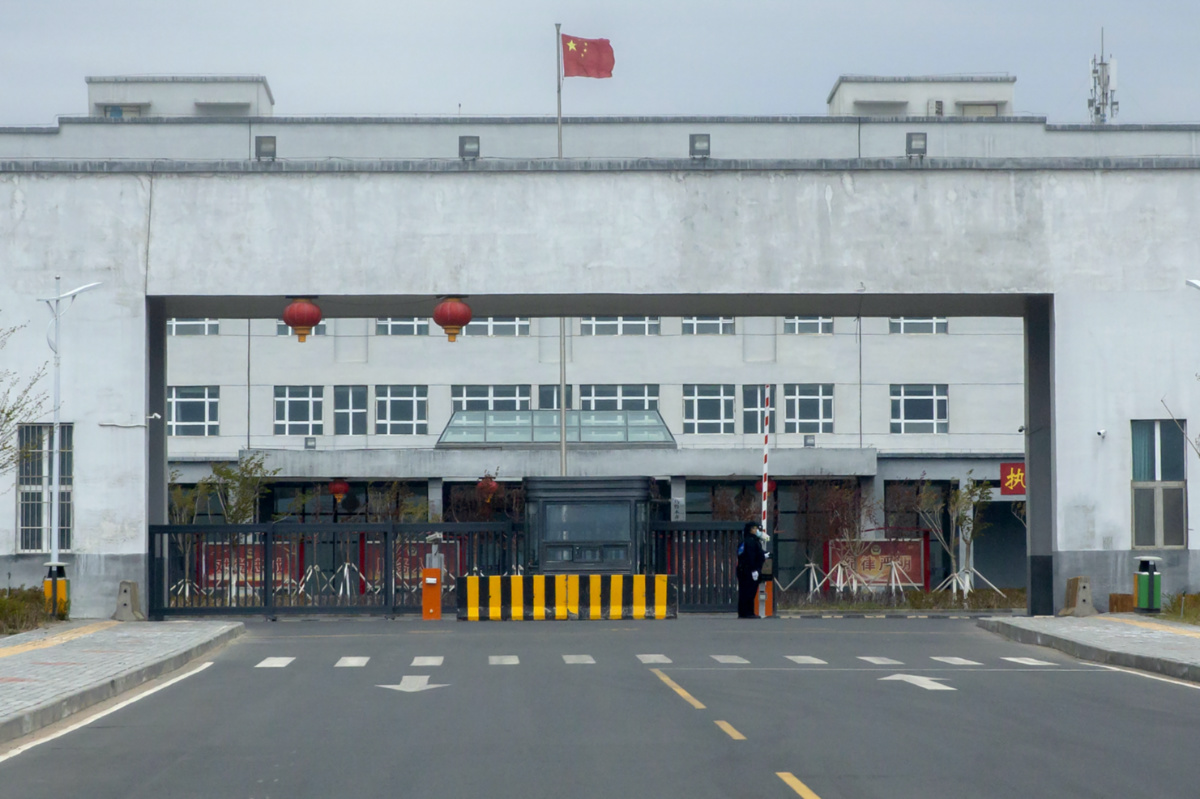
Police officers stand at the outer entrance of the Urumqi No 3 Detention Center in Dabancheng in western China’s Xinjiang Uyghur Autonomous Region on 23rd April, 2021. PICTURE: AP Photo/Mark Schiefelbein/File photo.
China is using the law “as a fig leaf of legality” in part to try and deflect international criticism about holding Uyghurs, said Jeremy Daum, a criminal law expert at Yale University’s Paul Tsai China Center.
“But following the law doesn’t mean justice or fairness,” said Daum, who reviewed the data and was not involved in its leak. “It just means it’s ‘legal.’”
Over the last eight years, experts say, Chinese authorities expanded the definition of extremism to include displays of religion such as growing a long beard or wearing a veil. Some charges for prisoners on the list are new and specific to Xinjiang, such as “preparing to carry out terrorism,” a charge that was newly defined in 2016. The sheer volume of the convictions was “extraordinary,” Daum added.
The plight of Nursimangul Abdureshid’s family shows how so-called “students” released from internment camps can simply be sent to prisons by the Chinese government instead.
“It’s a total lie, they just try to whitewash their crime,” said Abdureshid, who lives in exile in Turkey.
In 2017, a relative told Abdureshid that both her parents and her younger brother had been taken away to study, a euphemism referring to the short-term detention camps. It was only three years later, in 2020, that the Chinese embassy called her with information that all three had been arrested and sentenced to prison for more than a decade.
The leaked list was the first outside confirmation of what had happened to her brother since that call, she said. Her brother, Memetali Abdureshid, 32, had been sentenced to 15 years and 11 months on charges of “picking quarrels and provoking trouble” and “preparing to carry out terrorist activities.”
Nursimangul Abdureshid saw eight names she recognised on the list, but not those of her parents. She and six other Uyghur exiles who spoke with the AP believe the list is incomplete because they did not see some people they were close to, meaning the imprisonment rate could in fact be even higher.
The secretive nature of the charges against Memetali and others imprisoned is a red flag, experts say. Although China makes legal records easily accessible otherwise, almost 90 per cent of criminal records in Xinjiang are not public.
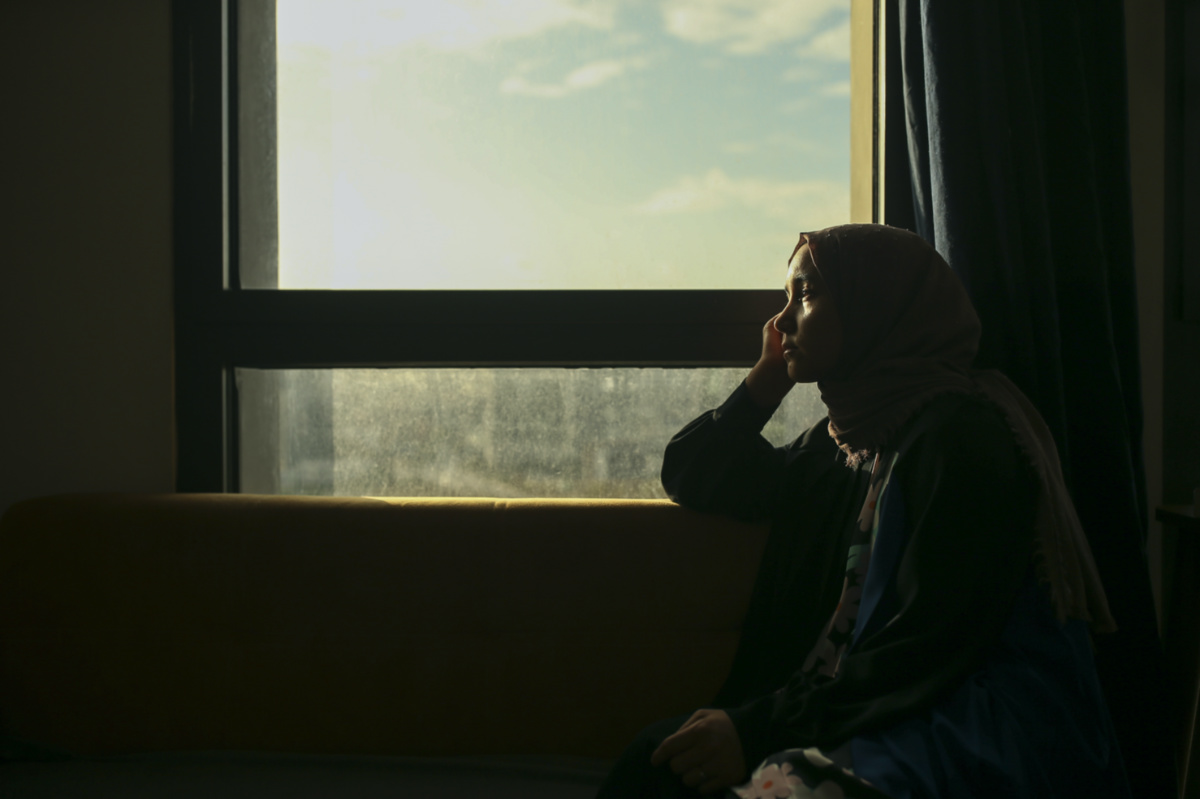
Uyghur Nursimangul Abdureshid, 34, poses for a photograph during an interview with The Associated Press in Istanbul, Turkey, on 4th May. Abdureshid’s brother, Memetali Abdureshid, who ran a car repair shop, was listed as being sentenced to 15 years and 11 months in prison on charges of “picking quarrels and provoking trouble” and “preparing to carry out terrorist activities.” PICTURE: AP Photo/Emrah Gurel.
The handful which have leaked show that people are being charged with “terrorism” for acts such as warning colleagues against watching porn and swearing, or praying in prison. In the most egregious cases, camp detainees were forced to confess their “crimes” in group sham trials and transferred to prisons, with no independent lawyers to defend them.
Another Uyghur from the township of Bulaqsu now living in exile said he knew 100 people on the list, including neighbours and cousins. Included were fathers and sons, both sentenced to jail, said the man, who spoke on condition of anonymity out of fear of retribution from Chinese authorities.
By the time Mahmutohti Amin, 81, a former spice trader who lives in Turkey, arrived in the Kashgar region of China in 2017, his son, Ghappar Tohti, had been arrested. His other son, Polat Tohti, also was arrested, his daughter-in-law told him.
But Amin only found out how long their sentences were when he saw the list. Ghappar got seven years; Polat got 11.
Abduweli Ayup, the Uyghur exile who passed the list to the AP, has closely documented the ongoing repression of his community. But this list in particular floored him: On it were neighbours, a cousin, a high school teacher.
“I had collapsed,” Ayup said. “I had told other people’s stories…and now this is me telling my own story from my childhood.”
The widely admired teacher, Adil Tursun, was the only one in the high school in Toquzaq who could teach Uyghur students in Chinese. He was a Communist Party member who had previously won a ‘Model Worker’ award, and he tutored children during his free time. Every year, the students from his class had the best chemistry test scores in the town.
The names of Tursun and others on the list made no sense to Ayup because they were considered model Uyghurs. Some were even eager to assimilate into the Han Chinese mainstream.
“The names of the crimes, spreading extremist thoughts, separatism…these charges are absurd,” he said.
But when Ayup circulated the list among the Uyghur diaspora to ask people to vouch for those they recognized, only eight out of 30 agreed to speak publicly. Ayup was disappointed, yet nonetheless determined to document the lockdown of his people.
“We will win at the end, because we are on the side of justice,” he said. “We are on the right side of history.”





